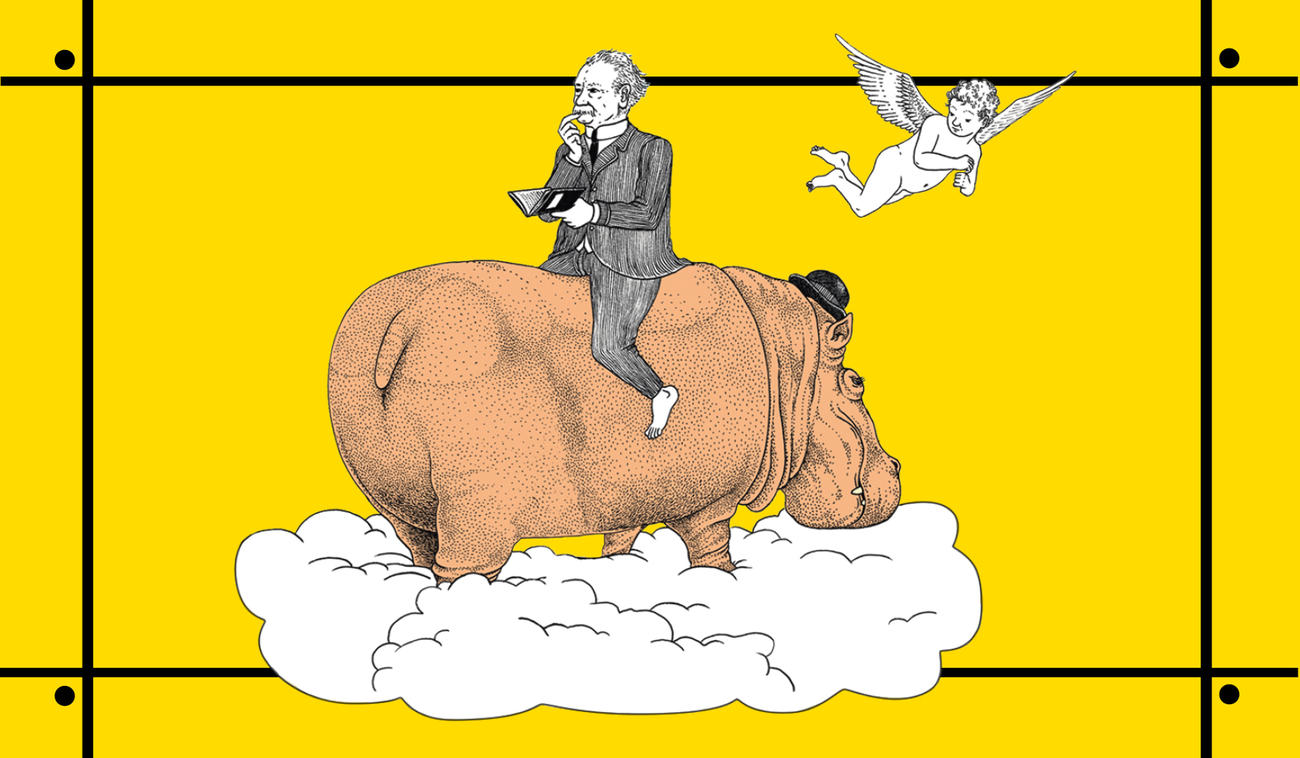
Q. Why are there almost as many jokes about death as there are about sex?
A. Because they both scare the pants off us.
Heidegger and a Hippo Walk Through Those Pearly Gates: Using Philosophy (and Jokes!) to Explore Life, Death, the Afterlife, and Everything in Between is exactly what it says. Daniel Klein, author of Every Time I Find the Meaning of Life, They Change It and Travels with Epicurus, has teamed up with his good friend Thomas Cathcart to take on death at full joke throttle.
Thomas Cathcart and Daniel Klein first made a name for themselves with the outrageously funny New York Times bestseller Plato and a Platypus Walk into a Bar. Now they turn their attention to the Big D and share the timeless wisdom of the great philosophers, theologians, psychotherapists and wiseguys.
Featuring Freud! Groucho Marx! Socrates! Lily Tomlin! Kierkegaard! Buddha! New Yorker cartoonists! Zombies! And of course, Heidegger! As hilarious as it is enlightening, Heidegger and a Hippo Walk Through Those Pearly Gates is a must-read for anyone and everyone who ever expects to die.
Read an extract from this fearless and brilliant book...
INTRODUCTION
Excuse us, but can you spare a moment? We’re taking a survey here and we’d like to ask you a question. It’ll only take a minute and we won’t even ask your name, okay? So here it is:
Do you really think you’re going to die?
Really and truly?
Do you really think your life is going to come to an end some day?
Take your time. No hurry to answer. Well, except for the fact that every moment that passes is one less moment in your lifetime.
If you’re anything like us, you probably don’t totally believe that the final curtain will come down one day. We can sort of grasp the fact of death in general, but in particular? Not so much. We’re like the Armenian-American writer William Saroyan, who wrote in a letter to his survivors, “Everybody has got to die, but I always believed an exception would be made in my case.”
On the other hand, we can’t quite get death completely out of our minds. Hard as we try to repress thoughts of our mortality, they keep popping up like those little furry heads in a Whack-a-Mole. That must be because death is one of the immutable facts of human life.
We are the only creatures who comprehend that we are going to die and we are also the only creatures who can imagine living forever. It’s that combo that drives us crazy. Death scares the hell out of us. And a life that doesn’t clearly have a destination – except over a cliff – seems devoid of meaning. This is undoubtedly why human mortality is intertwined with the fundamental questions of philosophy.
Questions like: What is the meaning of life – especially if it’s all going to end one day? How should our consciousness of death affect the way we live our lives? Would life have a radically different significance if we lived forever? After a millennium or two, would we be overcome by existential boredom and long for an end to it all?
Do we have souls – and if so, do they survive our bodies? What are they made of? Is yours better than mine?
Is there another dimension of time that cuts through the cycle of birth and death? Is it possible to “live forever” by always living in the present moment?
Is Heaven a place in time and space? If not, where and when is it? And what are the odds of getting in?
These are the kinds of questions that prompted us to sign up for our first philosophy courses some fifty years ago. But for better or worse, we got sidetracked by professors who told us that before we could tackle the Big Questions, we had to clear up some mind-numbing technical minutiae. Questions like: Does Bertrand Russell confuse “possible necessity” with “necessary possibility”?
Whaa??
Meanwhile, time was passing and we were still going to die. Eventually, we found our way back to those Big Questions in courses in metaphysics and theology, ethics and existentialism.
But immediately another obstacle arose: honestly contemplating our own death scared us to death. We couldn’t look the Reaper straight in the face without, well, fear and trembling. But we couldn’t avert our eyes either. Death: you can’t live with it, you can’t live without it.
What’s a person to do?
How about telling a joke? Hey, it couldn’t hoit.
Millie accompanied her husband Maurice to the doctor’s office. After he had given Maurice a full checkup, the doctor called Millie into his office alone. He said, “Maurice is suffering from a serious disease brought on by extreme stress. If you don’t do the following, your husband will die. Each morning, wake him up gently with a big kiss, then fix him a healthy breakfast. Be pleasant at all times and make sure he is always in a good mood. Cook him only his favorite meals and allow him to relax after eating. Don’t burden him with any chores, and don’t discuss your problems with him; it will only make his stress worse. Don’t argue with him, even if he criticizes you or makes fun of you. Try to relax him in the evening by giving him massages. Encourage him to watch all the sports he can on TV, even if it means missing your favorite programs. And most important, every evening after dinner do whatever it takes to satisfy his every whim. If you can do all of this, every day, for the next six months, I think Maurice will regain his health completely.”
On the way home, Maurice asked Millie: “What did the doctor say?”
“He said you’re going to die.”
Somehow hearing about mortality from Millie makes it more bearable. Jokes are funny that way: they can make a devastating point while defusing anxiety at the same time. That’s why there are so many jokes about sex and death – both of them scare the pants off us.
Happily, we happen to know a lot of jokes. In fact, we once discovered that jokes are a neat way to clarify general philosophical ideas, and we even wrote a book about that. So could jokes also illuminate philosophical concepts about life and death, Being and Non-Being, eternal souls and eternal damnation while at the same time alleviating our death-angst?
You betcha!
And that’s a good thing, because the time is nigh (we’ve both recently attained our biblically allotted three score and ten) for us to take an unflinching look at Death and what the big thinkers have to say about it, so we’re going to need all the laughs we can get. We’ll be prying open all the coffin lids on this issue, looking not only at the Big D but also at its prequel, Life, and its sequel, the Sweet Hereafter. We’ll be looking for clues.
We’ll start off by taking a look at the fabulous ways civilized societies have come up with to deny our mortality, especially through that perennial diehard, organized religion. In particular, we’ll check out Freud’s theory of how we create religions – as well as havoc – in order to support our illusion of immortality.
Next we’ll check in with some nineteenth-century philosophers from northern European countries. (Why aren’t there any philosophers on the Italian Riviera who write about death?) We’ll visit with that melancholy Dane, Søren Kierkegaard, who thought the only way to transcend our death-anxiety is to go through it. For Kierkegaard, all of our attempts to suppress our thoughts of death are counterproductive. The one way to get in touch with the eternal is to take the anxiety of nothingness into ourselves. Say it ain’t so, Sø!
Then we’ll see what that grim German philosopher Arthur Schopenhauer has to say. He virtually patented the concept of Weltschmerz (free translation: “The world makes me want to hurl”). You might think his attitude toward death would be super-schmerzy, but Schopenhauer, no fan of Life, regarded Death with utter apathy. He wrote that the “death of an individual is of absolutely no consequence” and therefore “our deaths should be . . . a matter of indifference to us.”
Indifference to death? That’s not real helpful, Artie, and the needle on our angst-meter is going crazy. Quick, we need a good indifference-to-death gag.
So Ole died, and his wife Lena went to the local paper to put a notice in the obituaries. The gentleman at the counter, after offering his condolences, asked Lena what she would like to say about Ole.
Lena said: “You just put ‘Ole died.’”
Perplexed, the man said, “That’s it? There must be something more you’d like to say about Ole. You lived together fifty years, you have children and grandchildren. Besides, if it’s money you’re worried about, you should know that the first five words are free.”
“Okay,” Lena said. “Put down,‘Ole died. Boat for sale.’”
No look at philosophies of death would be complete without a visit to the twentieth-century existentialists, who saw not-existing as a companion piece to existing – sort of like a matched set. So we’ll check in on Martin Heidegger and Jean-Paul Sartre, who tried to look unflinchingly at deadness. Heidegger claimed that we actuallyneed the anxiety of death to keep us from falling into “everydayness,” a state in which we’re only half alive, living with a deadening illusion. And Sartre told us to consider the alternative: the only beings that don’t have death anxiety are those that are already dead as doornails – like doornails, for example. Get real, they admonish us. We’d like to, but first we have to stop shaking.
So we’ll take a short break from all this heavy philosophizing to examine a popular form of death-denial: reassuring ourselves that we will live on in the hearts of those who knew us. This strategy assumes a certain sentimentality on the part of our loved ones that may or may not be, you know, there.
Old Sol Bloom lay dying in his bed, when he suddenly smelled the aroma of his favorite strudel wafting up the stairs. He gathered his remaining strength and lifted himself from the bed. Leaning against the wall, he slowly made his way out of the bedroom and forced himself down the stairs, gripping the railing with both hands. With labored breath, he leaned against the door frame, gazing into the kitchen.
If it weren’t for the pain in his chest, he would have thought he was already in Heaven. There, spread out on paper towels on the kitchen table, were literally hundreds of pieces of his favorite pastry. Sol smiled; this was one final act of love from his devoted wife, Sophie, seeing to it that he left this world a happy man.
With quivering hand he reached for a piece of the strudel. Suddenly he felt the slap of a spatula.
“Stay out of those,” Sophie said. “They’re for after.”
From here to profundity, as we grapple with twentieth-century theologian Paul Tillich’s answer to the question, “When is eternity?” (Turns out it’s now.) But “now” keeps shifting to “then.” So how about now? Slippery stuff.
We feel the need for something more solid to hang onto, so we’ll inspect the ancient Greek arguments for the immortality of the soul. But first we need to get clear on what we mean by a soul, how it differs from a mind, how both mind and soul differ from a body, and how all three differ from a zombie.
After laying the Greeks to rest, so to speak, we’ll look at Heaven and other destination spots for the afterlife.
Fred and Clyde had had many conversations over the years about the afterlife. They agreed that whoever died first would try to contact the other and tell him what Heaven was like.
Fred was the first to pass on. A year went by. One day the phone rang, and when Clyde answered, it was Fred!
“Is that really you, Fred?” he asked.
“You bet, Clyde. It’s really me.”
“Great to hear from you! I thought you’d forgotten. So tell me! What’s it like there?”
“Well, you won’t believe this, Clyde. It’s absolutely wonderful! We’ve got the most delicious veggies from the lushest fields you have ever seen. We get to sleep in every morning, have a fabulous breakfast, and then make love the rest of the morning. After a nutritious lunch, we go out in the fields and make love some more. Then it’s time for a gourmet dinner and some more lovemaking until bedtime.”
“Omigod!” said Clyde. “Heaven sounds fabulous!”
“Heaven?” said Fred. “I’m a rabbit in Arizona.”
Then we’ll wrap it all up with a peek at near-death experiences, séances, suicide, and some wild new ideas on how to avoid death altogether.
Hold it right there, guys. This is starting to sound like much ado about Nothingness.
Who said that?
Me, over here. Daryl Frumkin from down the block. I was walking my dog Binx when I heard you guys talking. And all I’ve got to say is this death thing is pretty simple, isn’t it? First you’re alive, then you’re dead. End of story.
Really, Mr. Frumkin? That’s all there is to it? So can we ask you a question?
Do you really think you’re going to die?
Surely There Must Be Some Mistake
Uh, Daryl, we’re still waiting for an answer here. Do you really think you’re going to die?
Well, sure, I know everybody dies. Frank Sinatra’s gone. So is Norman Mailer. Not to mention Napoleon, Harry Truman, Genghis Khan, and my wife’s Aunt Edna. So logically it stands to reason that one day I will be dead too. I know that as sure as I know apples fall down instead of up.
Good, Daryl. Well said. But let’s be perfectly clear here, we’re not talking about your twenty-first-century scientific mind that calls’ em the way it sees ’em. No, we’re talking about your regular, sitting-here-on-our-porch consciousness. Right now, do you really believe that your days are numbered, that each moment that ticks by is subtracting from your allotted moments as a living human being? That when you reach your that’s-all-she-wrote moment, you will cease to exist in every conceivable sense of existence?
Huh? You’re mumbling, Daryl. We know it’s a daunting question, but perhaps we can help you out here.
Our guess is that, in your heart of hearts, you don’t really believe you’re going to die. And the reason for that is that you are a civilized human being. That’s nothing to be ashamed of – at least not yet. We human beings have one heck of a problem accepting and incorporating this obvious fact into our consciousness. So what we do on a moment-to-moment, day-to-day basis is deny our mortality. Actually, we usually do this fairly easily with all the help we get from the social structures and customs of whatever civilization we happen to live in.
In his masterwork, The Denial of Death, the twentieth-century cultural anthropologist Ernest Becker wrote that even though we know objectively that we are mortal, we cook up all kinds of schemes to escape this devastating truth. (Becker died just two months prior to being awarded the Pulitzer Prize for his book – an untimely death if ever there was one.) Why we desire to deny our mortality is pretty obvious: the prospect of death is terrifying! It brings on the ultimate angst. It gives us the fantods to face the fact that we are only here for a short time, and when we are gone, we’re gone for eternity. How can we enjoy life with the clock ticking so loudly in our ear?
According to Becker, the only way most of us deal with this situation is delusion – in fact, the Big Delusion. The B.D. is the basic human drive – way more basic than the sex drive, he says – and it gives rise to “immortality systems,” nonrational belief structures that give us a way to believe we’re immortal. There’s the ever-popular strategy of identifying ourselves with a tribe, race, or nation that lives on into the indefinite future, with us somehow a part of it. Then there’s the immortality-through-art system, in which the artist foresees her work enduring forever, and therefore herself immortalized too – in the pantheon of Great Artists or, at the very least, as a signature at the bottom of a sunset landscape propped up in a corner of her grandchildren’s attic.
Then there are the top-of-the-market immortality systems enshrined in the world’s religions, ranging from living on as part of the cosmic energy in the East to sailing off to be with Jesus in the West. At a less lofty level, there is the immortality-through-wealth system. This one provides us with a nifty life goal to wake up to every morning: go get more money. That way we don’t have to think about the Final Bottom Line.
Wealth also admits us to a tribe that will live on: the exclusive club of movers and shakers. There’s even a bonus—we can pass along a piece of ourselves, our moolah, to the next generation.
But caveat emptor! (Or, if you’re not from ancient Rome, “Let the buyer beware!”)
When Bob found out he was going to inherit a fortune after his sickly father died, he decided he needed a woman to enjoy it with. So one evening he went to a singles’ bar where he spotted the most beautiful woman he had ever seen.
Her natural beauty took his breath away. “I may look like just an ordinary guy,” he said as he walked up to her, “but in just a week or two my father will die, and I’ll inherit twenty million dollars.”
Impressed, the woman went home with him that evening. Three days later, she became his stepmother.
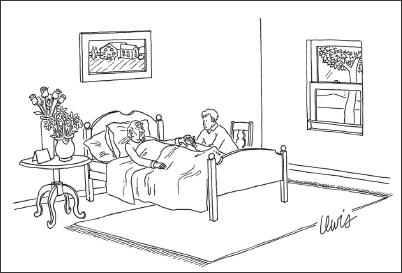
“I should have bought more crap.”
The go-for-the-bucks route offers another popular way of simulating immortality: donate to an immortal institution, hopefully one that will emblazon your name on the front of a building, or cut out the middleman and just build a monument to yourself.
But before you assume that your vow of poverty (or at least of a middle-income salary) will get you off the hook, think again, says Becker. You’re still probably striving for some earthly goal that lulls you into believing you’re here forever. Say you strive to be “hip” or “saintly” or “style-setting” – it’s the same deal. You’re still buying into the Big Delusion that you’re outsmarting the Reaper by adopting a role that transcends your puny, scary individuality and makes you “bigger than life”...and death.
We sustain these various delusions simply by being civilized, according to Becker. Virtually every civilization has evolved a shared immortality system. In fact, these systems are the basic function of a culture. Without them, we’d all go wacko with death-angst and we wouldn’t be able to keep our civilization humming along. We’d return to the law of the jungle. Denial of death is civilization’s survival strategy!
It’s easier to sustain a delusion if you have it in common with others in your culture, or better yet, right inside your own house. Consider the shared delusion of Clara and her husband.
Clara went to a psychiatrist and said, “Doctor, you’ve got to do something about my husband – he thinks he’s a refrigerator!” “I wouldn’t worry too much about it,” the doctor replied. “Lots of people have harmless delusions. It will pass.”
“But you don’t understand,” Clara insisted. “He sleeps with his mouth open, and the little light keeps me awake.”
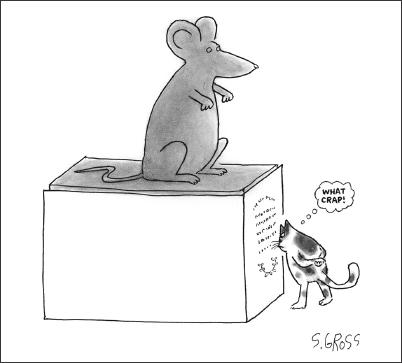
Unfortunately, immortality systems make us behave badly. When we identify with one immortality system and invest it with ultimate personal meaning, we have this nasty problem of coming up against other folks with different systems. We often see this in the clash of world religions, and it presents a major problem: all our immortality systems can’t be right, so the others’ must be wrong.
But civilization has provided a remedy for that too: Kill the bastards! Once they are dead, they won’t be a threat to our own sense of immortality. Hey, works for us.
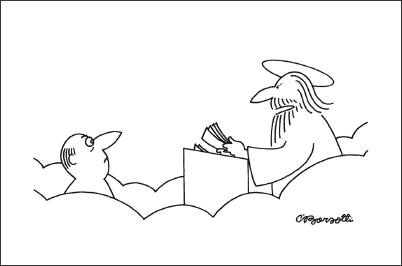
“You picked the wrong religion, period. I’m not going to argue about it.”
A lot of ink has been spilt over all the blood that has been spilt in the name of a particular religious doctrine and its specific immortality system. Christopher Hitchens’s God Is Not Great: How Religion Poisons Everything, the bible of the “new atheist” movement, has an exhaustive inventory of all the crimes against humanity committed to maintain the primacy of our own religion. But surrealist comedian Emo Phillips has a story that pretty much sums up the situation:
I was walking across a bridge one day, and I saw a man standing on the edge, about to jump off. So I ran over and said, “Stop! Don’t do it!”
“Why shouldn’t I?” he said.
“Well, there’s so much to live for!”
“Like what?”
“Well...are you religious?”
He said yes.
I said, “Me too! See? We’ve got lots in common already, so let’s talk this thing through. Are you Christian or Buddhist?”
“Christian.”
“Me too! Are you Catholic or Protestant?”
“Protestant.”
“Me too! Are you Episcopalian or Baptist?”
“Baptist.”
“Wow! Me too! Are you Baptist Church of God or Baptist Church of the Lord?”
“Baptist Church of God!”
“Me too! Are you original Baptist Church of God, or are you reformed Baptist Church of God?”
“Reformed Baptist Church of God!”
“Me too! Are you Reformed Baptist Church of God,reformation of 1879, or Reformed Baptist Church of God, reformation of 1915?”
He said, “Reformed Baptist Church of God, reformation of 1915!”
I said, “Die, heretic scum,” and pushed him off.
Phillips has an even shorter version (if you’re running out of time):
Probably the toughest time in anyone’s life is when you have to murder a loved one because they’re the devil.
ONE DEEP THINKER’S ILLUSION IS ANOTHER’S WISDOM
Becker’s contention that denial of death is mankind’s Big Delusion comes with an impressive pedigree. In his short treatise “The Future of an Illusion,” the father of psychoanalysis and mother of the unconscious, Sigmund Freud, named the fear of death as one of the major factors that drive humans to create and defend the illusion of gods and religion. Because we are helpless before the prospect of death, our unconscious invents a father-figure-in-the-sky to help us cope. Conveniently, Sky Daddy rewards good behavior too, so, Siggy says, we have a compelling reason to resist our most antisocial instincts – “incest, cannibalism, lust for killing,” that sort of thing. But most importantly, the Ultimate Father Figure alleviates our fear of death by providing life everlasting for those who conform to society’s demands.
In short, Freud thinks belief in God and in God’s promise of eternal life is a cultural fairy tale designed to help us escape the specter of death.
Never one to shy away from contradictions, Freud later cooked up the Todtriebe, or drive toward death (often mistranslated as the “death instinct”). Freud’s original hypothesis had been that the pleasure principle, Eros – the drive to maximize life, love, pleasure, and productivity – was humankind’s prime motive. But as Freud grew older he looked down upon humanity, and, lo, something else seemed to be in play here, something not so pretty. Like all that war and mayhem couldn’t be accounted for by just Eros. Enter the Death Drive.
At its most benign, the Death Drive expresses itself in our need to withdraw from stimulation and pursue peace and quiet; it’s a kind of dress rehearsal for death. Freud referred to this as the “Nirvana principle,” the need to “conduct the restlessness of life into the stability of the inorganic.” Be your own compost. Anyone who has watched bowling on TV from a BarcaLounger can relate.
So all this means we should turn our Todtriebe inward, right? No way, says Freud. This is one powerful drive, the Todtriebe, and once let out of its cage it turns into a monster: it won’t be satisfied with simply watching Bowling for Dollars; it’s got an appetite for masochism and suicide.
So we should turn our Death Drive outward, right? Nein! says Siggy. That way lie murder, mayhem, and war. Yikes! What’s a poor schlub to do?
See a shrink, says Freud. The goal of therapy – and of living – is to harmonize the Death Drive and Eros, get them into balance.
JUNG AT HEART
Just because the whole God-religion-eternal-hereafter package comes from our unconscious doesn’t necessarily mean that it’s all hog swill, argued Freud’s onetime disciple, the Swiss analytical psychologist Carl Gustav Jung. Maybe our unconscious is wiser than our conscious mind. Maybe what Sigmund calls unconscious fabrication is really unconscious confirmation. Maybe we don’t make up religions, we discover them inside us. And just maybe, as the unconscious psyche gets passed on from generation to generation, it evolves on its own, getting smarter while our conscious minds merely continue to limp along.
What is really going on, says Carl Gustav, is that religions speak for the psyche by providing symbols that come “from the heart.” The reason these symbols have revelatory power is that they are products of our deep, unconscious mind, a storehouse of instinctual wisdom that is accessible to our conscious mind only through dreams, cultural myths, and religions. It is when the conscious mind gets out of touch with this deeper psyche – becomes alienated from it – that we develop neurotic symptoms, like getting depressed as hell by the ultimate meaninglessness of it all.
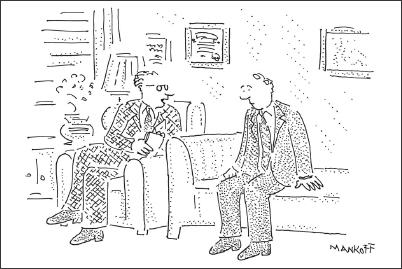
“Look, making you happy is out of the question, but I can give you a compelling narrative for your misery.”
PSYCHED!
Had Jung lived just a little longer – he died in 1961 – he might have added psychedelics to his list of pathways to one’s deeper, more enlightened psyche. Magic mushroom and LSD trips provided many a sixties seeker with transcendental insights into what appeared – at least at the time – to be a Higher Reality.
Yet to our knowledge, none of these drug-induced states produced an account that is either as astounding or as clear as Jill Bolte Taylor’s meticulous observations while watching herself undergo a massive stroke. In 1996, this Harvard neuroscientist watched in fascination as the left hemisphere of her brain shut down. In the process, Dr. Taylor came to know a spiritual reality that Jung only dreamed of.
Taylor explains that the right hemisphere of the brain processes what is going on for us at the present moment. It thinks in pictures, taking all of the sights and sounds and smells occurring for us right now and putting them together in a whole. In our right brain, we are “perfect, whole, and beautiful.” We experience ourselves as an “energy being” that is connected to all the energy in the universe and to the energy of the whole human family.
By contrast, our left brain is linear and methodical. It takes the present moment and picks out details, connects them to past learning, and projects future possibilities. It thinks in language, not pictures, and one of the things it says is “I am.” It experiences the self as separate from the energy flow around it and separate from other human beings. It is the function of this left brain that Taylor largely lost during her stroke.
As her left brain shut down, she experienced herself as boundaryless and at one with all the energy in the universe. She felt peaceful and euphoric. At the same time, her left brain – her anxious brain – would intermittently kick in with the message, “You are in danger of dying! You must get help!” But getting help without the sustained assistance of her left brain was nearly impossible. Even after she managed to phone for help, as she tried to explain her situation, all she could do was bark like a dog.
Later, in the hospital, she experienced the world around her as chaos and noise, but then suddenly felt her spirit soar through a “sea of euphoria.”
Taylor’s conclusion? The world is full of loving, peaceful people who can “step to the right of their left brain.” We are at once beings who are “the life-force power of the universe” and also beings who are separate from the world and separate from others. And most significantly, to some degree we can choose to be in either place at any given time.
What Taylor experienced in her right brain was what Jung called the deep, unconscious source of religious experience. Jung had only speculated about where this experience originates; Taylor pinpointed its location. Taylor’s right-brain experience exploded her left brain’s constructs of time and space. Her experience was transcendental: she was part of the Immortal All.
Jung says that the unconscious psyche is not only instinctually aware of the fact that we die, but actually accepts this fact. The psyche prepares itself for death, usually many years before it happens. While our rational, conscious mind sees death as an anxiety-provoking, grim finale, our psyche – our right brain? – accepts it.
Jeez, I guess there is more to death than coffin nails, isn’t there?
Yes, Daryl, and we’re afraid it only gets scarier.
Heidegger and a Hippo Walk Through Those Pearly Gates: Using Philosophy (and Jokes!) to Explore Life, Death, the Afterlife, and Everything in Between is available now in all good bookshops, on the Text website (free postage!) and as an ebook.



